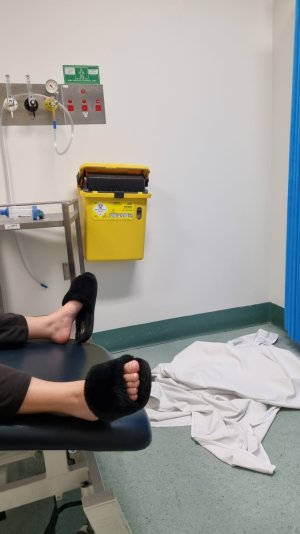Experts issue urgent warning about popular medication linked to serious mental health risks – should you be worried?
By
Maan
- Replies 29
Content Warning: This article mentions suicide and sexual assault, which may be distressing for some readers. Discretion is advised.
Recent warnings have raised serious concerns about the safety of a commonly prescribed medication used by many Australians.
What was once considered a reliable treatment option has now become the focus of alarming reports about its potential side effects.
As investigations unfold, the implications for patients and healthcare providers are becoming clearer, with experts urging caution.
Montelukast, sold under the brand name Singulair, is a medication used to treat and prevent chronic asthma in adults and children.
Unfortunately, it has been linked to serious psychiatric side effects. According to a recent research in the US, montelukast attaches to brain cells that control mood, attention, decision-making, and impulse control, which may explain its link to mental health issues.
The Therapeutic Goods Administration (TGA) in Australia received roughly 200 reports of behavioural side effects associated with the drug over the last decade.
These reports included 57 cases of depression, 60 cases of suicidal thoughts, and 17 suicide attempts or incidents of intentional self-harm.
Seven cases involved patients taking montelukast who went on to commit suicide.
Melbourne boy Harrison Sellick was one of those affected.
He was prescribed montelukast when he was just two years old and began experiencing severe behavioural issues, including suicidal thoughts, by age five.
His mother, Vanessa, recalled that Harrison had long meltdowns lasting up to an hour and a half, and would make general comments about death and self-loathing.
Harrison, now 17 and off the medication, attempted suicide at the age of five.
The use of montelukast, typically prescribed for asthma, is widespread in Australia.
However, experts have urged caution, as studies show the drug may increase the risk of mental health issues for some users.
Dr Nial Wheate, Professor of Pharmaceutical Chemistry at Macquarie University, pointed out that, over the same period the TGA received reports, more than 200,000 montelukast prescriptions were filled in Australia.
This highlights the widespread use of the medication despite the growing concerns.
Despite the concerning figures, Dr Wheate stressed that there is no conclusive evidence that montelukast directly causes depression and suicide.
However, he noted that it seems to heighten the risk for certain individuals.
Anyone concerned about montelukast's potential effects was advised to consult with their doctor before making any changes to their treatment.
Discontinuing the drug abruptly could put asthma patients at risk of serious health consequences, including life-threatening attacks.
Montelukast works by blocking chemicals that cause airways to swell and constrict during an asthma attack.
For patients whose asthma is difficult to manage with other treatments, montelukast has been a vital alternative since it was first prescribed in the 1990s.
However, the controversy surrounding the medication has persisted.
This is particularly true after a US investigation confirmed a link between montelukast and psychiatric conditions, including suicidal thoughts and hallucinations.
The US Food and Drug Administration (FDA) revealed that lab tests had shown montelukast binds significantly to receptor cells in the brain that are associated with psychiatric effects.
Despite these findings, the FDA has not pulled the drug from the market, noting that studies are still ongoing.
Singulair became a lucrative product for Merck after its release in 1998, generating billions in sales.
Early advertising touted the drug as safe, with side effects considered minimal, even claiming the medication’s effect on the brain was negligible.
However, by 2019, health authorities had documented thousands of psychiatric incidents linked to montelukast, including dozens of suicides.
One such case was that of Nicholas England, whose 22-year-old son, Nick, fatally shot himself less than two weeks after beginning the drug.
Nick England, otherwise healthy with no prior mental health issues, had trouble sleeping after taking montelukast and tragically ended his life.
Merck's spinoff company, Organon, which now markets Singulair, maintained that the drug’s safety profile remained solid.
They also stated that the product label contained sufficient information about its benefits, risks, and potential side effects.
Despite these claims, health authorities and campaigners continue to call for more to be done to raise awareness about the risks of montelukast.
For now, both doctors and parents must weigh the potential benefits of the medication against the risks, especially when it comes to children.
If you or someone you know is struggling, support is available through mental health helplines that can provide guidance and assistance.

As the debate around the safety of montelukast continues, many are left wondering whether the potential risks outweigh the benefits for certain individuals.
What are your thoughts on the use of montelukast for children? Have you or someone you know experienced any side effects?
Share your thoughts in the comments below!
Recent warnings have raised serious concerns about the safety of a commonly prescribed medication used by many Australians.
What was once considered a reliable treatment option has now become the focus of alarming reports about its potential side effects.
As investigations unfold, the implications for patients and healthcare providers are becoming clearer, with experts urging caution.
Montelukast, sold under the brand name Singulair, is a medication used to treat and prevent chronic asthma in adults and children.
Unfortunately, it has been linked to serious psychiatric side effects. According to a recent research in the US, montelukast attaches to brain cells that control mood, attention, decision-making, and impulse control, which may explain its link to mental health issues.
The Therapeutic Goods Administration (TGA) in Australia received roughly 200 reports of behavioural side effects associated with the drug over the last decade.
These reports included 57 cases of depression, 60 cases of suicidal thoughts, and 17 suicide attempts or incidents of intentional self-harm.
Seven cases involved patients taking montelukast who went on to commit suicide.
Melbourne boy Harrison Sellick was one of those affected.
He was prescribed montelukast when he was just two years old and began experiencing severe behavioural issues, including suicidal thoughts, by age five.
His mother, Vanessa, recalled that Harrison had long meltdowns lasting up to an hour and a half, and would make general comments about death and self-loathing.
Harrison, now 17 and off the medication, attempted suicide at the age of five.
The use of montelukast, typically prescribed for asthma, is widespread in Australia.
However, experts have urged caution, as studies show the drug may increase the risk of mental health issues for some users.
Dr Nial Wheate, Professor of Pharmaceutical Chemistry at Macquarie University, pointed out that, over the same period the TGA received reports, more than 200,000 montelukast prescriptions were filled in Australia.
This highlights the widespread use of the medication despite the growing concerns.
Despite the concerning figures, Dr Wheate stressed that there is no conclusive evidence that montelukast directly causes depression and suicide.
However, he noted that it seems to heighten the risk for certain individuals.
Anyone concerned about montelukast's potential effects was advised to consult with their doctor before making any changes to their treatment.
Discontinuing the drug abruptly could put asthma patients at risk of serious health consequences, including life-threatening attacks.
Montelukast works by blocking chemicals that cause airways to swell and constrict during an asthma attack.
For patients whose asthma is difficult to manage with other treatments, montelukast has been a vital alternative since it was first prescribed in the 1990s.
However, the controversy surrounding the medication has persisted.
This is particularly true after a US investigation confirmed a link between montelukast and psychiatric conditions, including suicidal thoughts and hallucinations.
The US Food and Drug Administration (FDA) revealed that lab tests had shown montelukast binds significantly to receptor cells in the brain that are associated with psychiatric effects.
Despite these findings, the FDA has not pulled the drug from the market, noting that studies are still ongoing.
Singulair became a lucrative product for Merck after its release in 1998, generating billions in sales.
Early advertising touted the drug as safe, with side effects considered minimal, even claiming the medication’s effect on the brain was negligible.
However, by 2019, health authorities had documented thousands of psychiatric incidents linked to montelukast, including dozens of suicides.
One such case was that of Nicholas England, whose 22-year-old son, Nick, fatally shot himself less than two weeks after beginning the drug.
Nick England, otherwise healthy with no prior mental health issues, had trouble sleeping after taking montelukast and tragically ended his life.
Merck's spinoff company, Organon, which now markets Singulair, maintained that the drug’s safety profile remained solid.
They also stated that the product label contained sufficient information about its benefits, risks, and potential side effects.
Despite these claims, health authorities and campaigners continue to call for more to be done to raise awareness about the risks of montelukast.
For now, both doctors and parents must weigh the potential benefits of the medication against the risks, especially when it comes to children.
If you or someone you know is struggling, support is available through mental health helplines that can provide guidance and assistance.
Key Takeaways
- Montelukast, sold as Singulair, has been linked to serious psychiatric side effects, including depression, suicidal thoughts, and self-harm, leading to warnings, particularly for children.
- The Therapeutic Goods Administration (TGA) in Australia received around 200 reports of behavioural side effects, including suicide attempts, over the past decade, despite widespread use of the medication.
- Experts, including Dr Nial Wheate, highlight that while there is no conclusive evidence montelukast directly causes these mental health issues, it may heighten the risk for certain individuals, especially in children.
- Despite the controversy and concerns raised, the medication remains on the market, with ongoing investigations into its effects, and health authorities continue to call for greater awareness of the risks.
As the debate around the safety of montelukast continues, many are left wondering whether the potential risks outweigh the benefits for certain individuals.
What are your thoughts on the use of montelukast for children? Have you or someone you know experienced any side effects?
Share your thoughts in the comments below!
Last edited:









